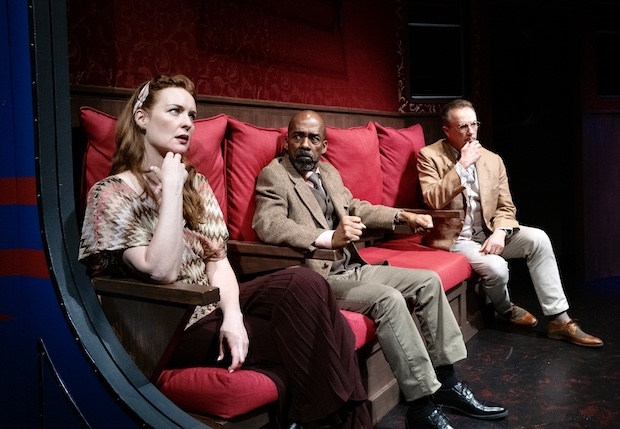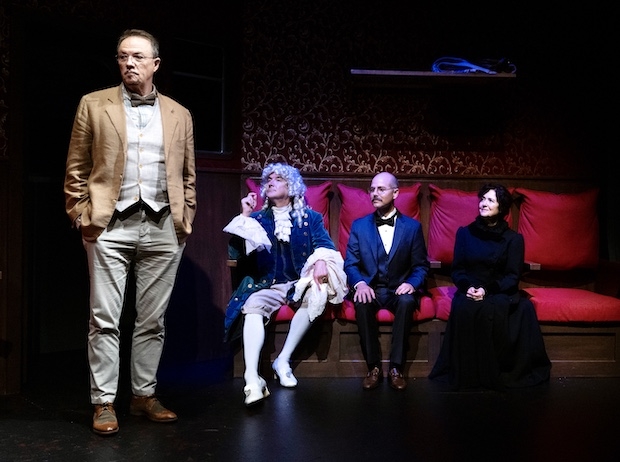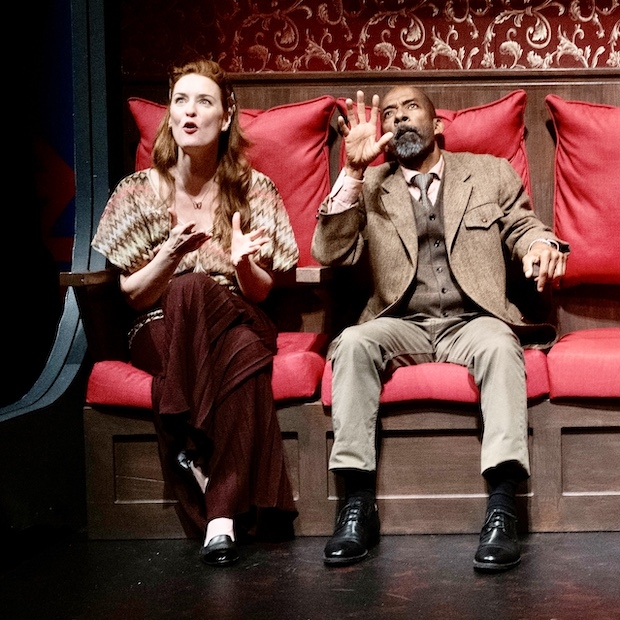Review: In Strings Attached a Love Triangle Leads to a New Kind of Big Bang

(© John Quilty)
Like electrons orbiting protons, playwrights seem to have an innate attraction to physics. In recent years we've seen Nick Payne's Constellations (about the multiverse), Simon Stephens's Heisenberg (inspired by that physicist's "uncertainty principle"), and now Carol Buggé's Strings Attached, which is playing at Theatre Row under the banner of Pulse Theatre. What is the source of this obsession? I think I'm ready to propose a theory — but first, the play.
It's about cosmologist June (Robyne Parrish), who is married to cosmologist George (Paul Schoeffler), but who is also sleeping with particle physicist Rory (Brian Richardson). The three share an incredibly spacious (yet uncomfortably tense) train compartment from Cambridge to London to see the West End production of Michael Frayn's Copenhagen (a play about a meeting between physicists Niels Bohr and Werner Heisenberg…him again). During the one-hour ride secrets are revealed, painful memories exhumed, and the theory of the ekpyrotic universe is devised.
Buggé was inspired by the actual train ride shared by Burt Ovrut, Paul Steinhardt, and Neil Turok, who really did come up with the radical merger of String Theory and M Theory that completely upended the concept of the Big Bang — although I'm not sure their out-of-the-lab relationship was ever quite as sexy as depicted here.

(© John Quilty)
Over the course of the play, our randy scientists are visited by the ghosts of physics past: Isaac Newton (Jonathan Hadley), Marie Curie (Bonnie Black), and Max Planck (Russell Saylor). The personal fuses with the professional across space and time as the physics metaphors fly at us with the intensity of the Large Hadron Collider.
"Maybe I'd be an electron being shared by a couple of big, strong atoms," June coos when asked what particle she would be. It's an answer that seems a little too obvious for a woman trying to keep her affair on the down-low; but then again, it's a question I'm not sure any of these published scientists would ever ask one another.
Buggé has a capacious imagination verging on the hyperactive: You're just processing a bad physics joke when a character launches into a monologue about subatomic membranes. Flip charts are used to explain the "double slit" experiment and Schrödinger's cat (that macabre metaphor that refuses to die…or maybe it's already dead). It might all make for a thrillingly cerebral evening of theater if it built up to something rather than bouncing between soap opera and physics lecture, like a channel-surfing shut-in.

(© John Quilty)
An earlier version of the play, simply called Strings, seems to have suffered from similar problems. Buggé's addition of comic relief in the form of an absurd Ukrainian couple and an equally absurd American couple (both played by Black and Saylor) has only complicated an already very busy script.
The performers do their best to convey complex scientific concepts in ways that are dramatically engaging (Parrish is particularly good at this). Unfortunately, most of the male actors have adopted distractingly plummy English accents that seem to place their characters somewhere between Leicester and Lannisport.
Director Alexa Kelly drives the play at breakneck speed, narrowly averting derailment. Jessica Parks's train carriage set gets the job done and is greatly enhanced by the whiz of a train passing in the other direction, as ominously created by Joyce Liao (lights) and Louis Lopardi (sound). Elena Vannoni's realistic costumes (rumpled jackets, mismatched pants) temporarily lull us into believing these people could actually be academics — but, of course, they always resume talking.

(© John Quilty)
You know that we're heading nowhere good when the actors line up along the edge of the stage to shout evocative imagery and platitudes. "Socialized medicine…The return of liberalism…Multiple orgasms…The outlawing of junk mail," our physicists begin listing their deepest desires, like heavily medicated participants in an Upper West Side community board meeting. "I believe in the scientific method," June pledges sincerely. Of course, the thing about the scientific method is that it doesn't require you to believe. It asks for proof.
That may be what is so seductive to dramatists about physics, the branch of science that brushes most intimately against the big questions. It seems to hold out the promise of conclusive proof of the wonderous, to distill existence in an equation and foresee fate in a theorem — religion without the squishiness of faith. Actual physicists make no such claims, despite the grand pronouncements of their imitators on the stage. And as Strings Attached demonstrates, trying to force physics into the role of religion leaves us with pithy clichés better suited to a greeting card than scripture — much less a scientific journal.











